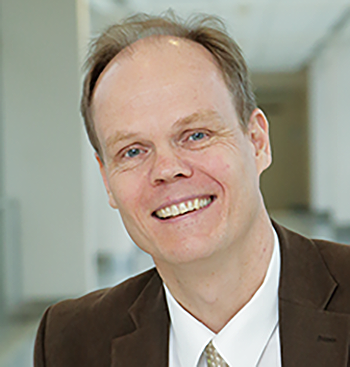Antibiotics Could Assist Liver Cancer Care
Four Questions with Dr. Tim Greten

IRP research led by Dr. Tim Greten suggests that antibiotics could be a useful tool in the fight against liver cancer.
There are over 100 different types of cancer, with liver, breast, and colon cancers among the most common. At the NIH, researchers across the organization have long been committed to furthering cancer research in an effort to increase the number of cancer survivors. They consistently push the boundaries of this field each day in the hopes that their work could lead to better diagnoses, better treatment, and better outcomes for cancer patients.
A 2018 study by IRP senior investigator Tim Greten, M.D., and his IRP colleagues did just that and more. Their research pushed the norms of cancer research by studying how a treatment as simple as antibiotics affects cancerous liver tumors. By utilizing antibiotics to wipe out the collection of microorganisms living in the digestive tracts of mice — known as the gut microbiome — the team identified a link between the gut microbiome and the behavior of the liver’s immune cells, which play a role in defending the organ against cancer. The IRP team ultimately showed that antibiotic treatment reduced the development of liver tumors in these ‘germ-free’ mice, and it also reduced the likelihood that tumors in other areas of the body would metastasize — or spread — to the animals’ livers, a finding that could one day prove beneficial to future cancer patients.
In recognition of National Antibiotic Awareness Week this week, I spoke with Dr. Greten to explore why he was interested in studying the impact antibiotics might have on cancerous tumors, what collaborations were important in this study, and how he is expanding on his research today.
What prompted you to study the impact of antibiotics on cancerous tumors?
“When I first read about cancer researchers who were studying the gut microbiome, I couldn’t believe what I was reading. It seemed bizarre to me. However, it was from reading about these studies and the work of other researchers that I began thinking about the potential of the gut microbiome myself. I really began this research out of pure curiosity.
“As a physician, I see patients with cancer fairly often and I didn’t want to believe that something as simple as antibiotics could have such a profound impact on tumor growth. As we all know, chemotherapy and radiation therapy are very advanced, commonly used treatments for cancer. However, through our study, we were all of a sudden seeing that antibiotics could change the gut microbiome and produce surprising effects on tumor growth. It’s amazing but it almost seems too simple.”
What was the most challenging aspect of this study?

Dr. Tim Greten
“We faced a number of challenges when conducting this study. Notably, in order to test the link between the gut microbiome and the effectiveness of cancer treatments, the first experiment we conducted was to confirm the impact of antibiotic treatment. The ideal scenario is to perform this research in germ-free mice, which are mice that have no microorganisms living in or on them. As one can imagine, germ-free mice need special housing to ensure that they stay germ-free, which is very difficult to execute. At the time, we did not have easy access to the support we needed to successfully utilize these germ-free mice, which were essential to our study. After quite a lot of preparation and perseverance, I was able to obtain approval for my team to conduct its planned experiments with germ-free mice.
“Another challenge we faced were the study criteria required by the journal's review team. The reviewers required that we prove that we had the ability to colonize, or infect, mice with a single type of bacteria that would reverse antibiotics' inhibitory effect on tumor growth. From an experimental point of view, this was very difficult to do, as there are a number of challenges to overcome in order to prove this. It took us quite a bit of time to do so.”
What collaborations were important in conducting this research?
“There were three very important collaborations that contributed to this study. First was the pivotal collaboration with Giorgio Trinchieri, and his group at the NIH’s National Cancer Institute. Giorgio is a true expert in the microbiome and helped my team study the germ-free mice and conduct bacterial DNA sequencing, which were both essential to our research. It was an extremely helpful collaboration as these were not our areas of expertise at all.
“The second key collaboration happened by happenstance. When we first began this research, we had no idea that immune cells called NKT cells — cells that share properties of both T cells and natural killer cells — would play such an important role in this system we were studying. Through our research, we found that NKT cells were the cells that would ultimately inhibit tumors from forming in the liver. By chance, I had been participating in joint lab meetings with another intramural investigator, Jay Berzofsky, who happened to be an expert in NKT cells. Once we realized that these cells played a role in the system, it was instrumental to tap into Jay’s expertise.
“The third collaboration, which was also extremely valuable, was with another intramural investigator, Xin Wei Wang . At the time of our study, Xin Wei had already created a database filled with metabolic data from human livers from one of his own cohort studies in patients with liver tumors. Since he already had data on liver tissue and bile acid readily available, we were able to use those data for our confirmatory studies in humans, which was unbelievably helpful.”
What impact has this research had on the field to-date and what are your plans for the future?
“To be honest, I don’t think that this research has had a direct impact on cancer research or cancer care as of yet. At this point in time, I believe it is too early to see such a result, but we will see! With that said, for our group at the NIH and our own experiments, this research has had a huge impact on our focus of study.
“Following the initial study in germ-free mice, our group began expanding upon the work in a number of follow-up studies on the topic. Based on the original study, we now have an ongoing clinical trial where we’re hoping to investigate the experimental questions addressed in our previous animal studies now in patients, as opposed to mice. We want to see if mechanisms similar to those we discovered in mice can apply to patients, and also investigate whether antibiotic treatment, in collaboration with other drugs, can reduce primary and metastatic liver tumors in human patients.”
Head over to our Accomplishments page for more information on Dr. Segre and Dr. Kong’s research, and subscribe to our weekly newsletter to stay up-to-date on the latest breakthroughs in the NIH Intramural Research Program.
Related Blog Posts
This page was last updated on Tuesday, January 30, 2024
